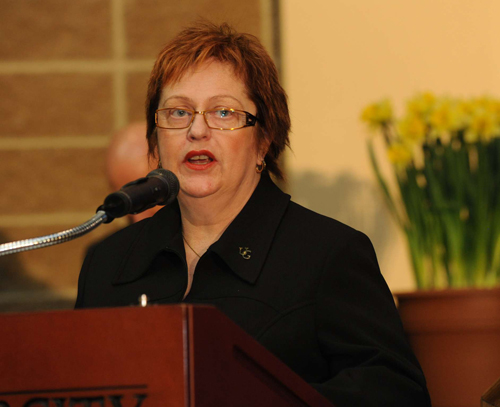
Think of a university course where students work closely with the professor in small seminar groups and all the assignments are case studies based on current world issues. Sounds like a graduate-level class, but it’s not.
These are first-year students, and the course is taught entirely online.
History professor Jacqueline Murray, who teaches “The Politics, Science and Culture of Hunger,” says that despite the online aspect “the groups functioned extremely well as a learning community.” All the case studies, she adds, were based on real-life scenarios, and she expected the students to do solid research to develop responses and approaches.
Murray is an advocate of enquiry-based learning and designed the course to engage her students. It consisted of several case studies focused on hunger issues around the world, from a refugee camp in Kenya to the streets of downtown Vancouver.
It was hard work, says undergraduate Stephanie Bishop, but well worth it. “I had a tough time at first because it was my first online course and my first time working with a group that way.” The case studies were open-ended, and Bishop says that every time she thought the group was done “someone would come up with another idea or perspective, and there’d be more to do.” Murray was also part of each group, and Bishop says her input was invaluable. “If we were going down the wrong track, she’d nudge us back by asking a few questions and getting us to think a bit deeper.”
Bishop also admits to being terrified at first by the evaluations that were another required part of the course. “We got lots of feedback from Prof. Murray and from each other, and it was helpful because it was specific. It wasn’t just ‘you did this wrong,’ but people talked about how things could be improved,” she says.
International development student Lucas Burton is so enthusiastic about the course that he advises incoming first-year students, “If you need to drop another course to take this one, do so. It’s changed how I see the world, how I do research, how I learn.”
An important piece of learning, he says, was figuring out how to work as a group. “Because it was online, people would check in at different times, and there was a real learning curve for collaboration. But it leads to a style of learning that is more critical and reflective and teaches you to question your assumptions. I learned not just a lot about the problems of hunger in today’s world, but about how to work in a group, how to properly and thoroughly research a topic, and how to accept constructive criticism and work on it and move on.”
Jolene Labbe, an arts and science student, says she signed up for the course a bit impulsively. “I was interested in the topic because I took three years off after high school and did some volunteer work in a medical clinic in India.” She appreciated the class format and the opportunity to work closely with Murray. “For me, the best part was learning to look at issues from multiple perspectives. The course is multi-disciplinary, so you are working with people from different programs, and they look at each case in a different way.
“We had one case about the Enviropig, and I was immediately interested in the ethical implications, but we had a nanoscience student in my group who was focused on the science aspects and a political science student who focused on what regulations and policies would be needed. We’d each do our own research tasks and present to each other.”
While Labbe had been a little intimidated by the technical aspects of an online course, she found her computer skills improved and says, “I really learned to enjoy the process of research. The one-to-one interaction with Prof. Murray was great as well; she helped me figure out my strengths and weaknesses. I now feel much better prepared to take on more challenging courses. It’s been the best course.”
“We learned to really research in depth, and to back up every thought and idea with solid evidence,” Bishop adds. “I’ve already started to get higher marks on my essays in other classes because of what I’ve learned in this course.”
Murray’s not surprised. “The students were working at such a high level. It’s amazing what they accomplished.”
Labbe, like Burton, encourages other students to sign up next year. “You don’t get many opportunities to take a course like this in first year at other universities. I’m glad I got to take advantage of it.”